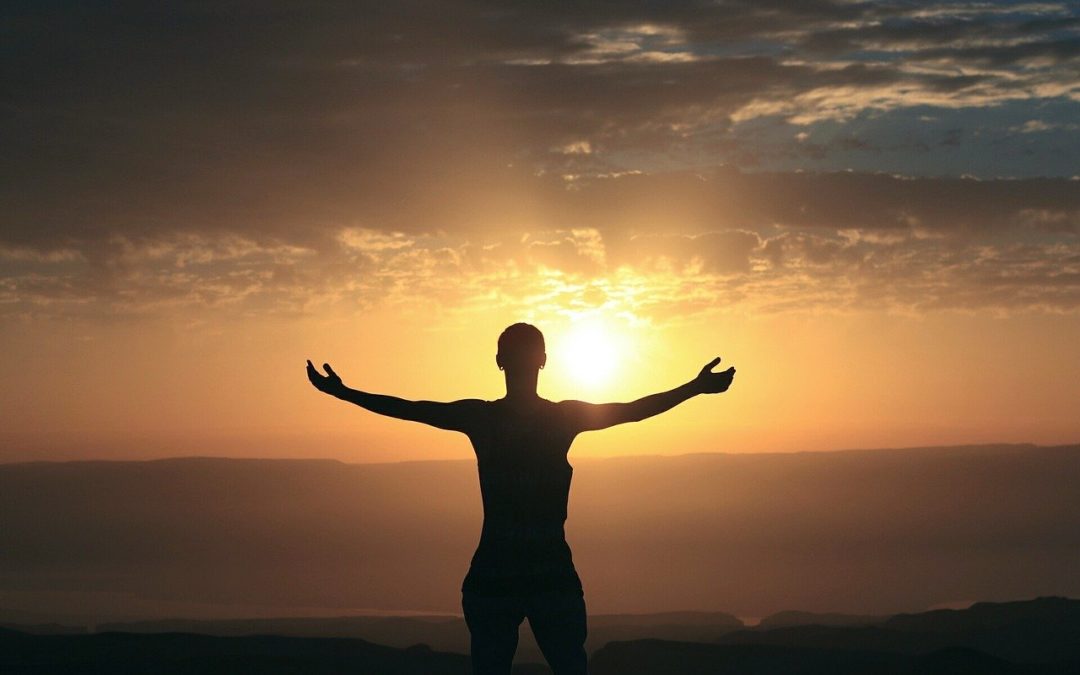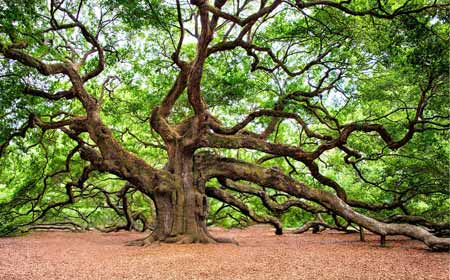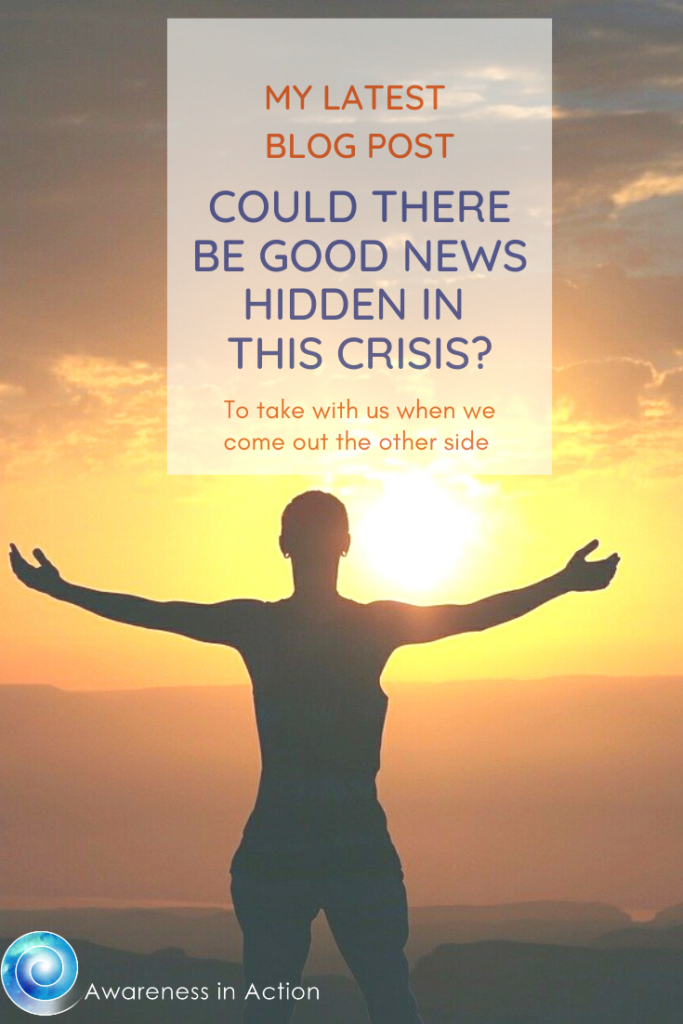
Can there be good news hidden in this crisis?
Isn’t it incredible how quickly our lives have changed in the last few weeks because of the Corona Virus? Seemingly overnight our way of living has altered dramatically. Yet even among all the anxiety, grief and disorientation there are still glimmerings of good news. It’s this good news that could be the basis for our long-term recovery.
We are all in this together
A striking feature of this situation is how it affects everyone. Not long ago we were watching scenes of flooding in the UK, of refugees flooding across the border in Turkey and the bush fires in Australia and Brazil. Like most people, I found these scenes distressing and they occupied my mind for ages. At the same time, I had the luxury of them not happening to me—they were happening to other people.
All this has changed now. This virus is affecting the lives of everyone on the planet—how we work, socialise, keep our economy afloat—the list is endless. There’s no room to say one country is getting something wrong and another right. We just don’t know. Governments are making up their responses as we go along. They’re trying their best, but they don’t really know what will happen.
Everyone is anxious and uncertain. However wealthy, powerful or successful you are it doesn’t matter. We’ve seen celebrities, royalty and politicians all going down with it. The virus does not discriminate.
So, what is the good news here?
If we pay attention this could be a real wake-up call for how we care for each other. As we witness each person’s vulnerability it’s brought home to us strongly that is the very nature of being human. We all know this but in the rough and tumble of living it can get pushed to the back of our minds. As we focus on making living, caring for our families and living as best we can it’s all too easy to overlook the importance and uniqueness of each human being.
Now as we stand side by side through this pandemic, we know that just as each of us is anxious and worried, so is everyone else. Whenever we feel closed in by not being able to go out into the spring air, we can remember that this is how it is for almost everyone. As we struggle to get in supplies, we know that it’s not just us wanting to make our home as safe as possible. It’s as if our personal defences have melted away and we are all vulnerable together.
We are experiencing the reality of our connected world
The source of the coronavirus is believed to be a “wet market” in Wuhan which sold both dead and live animals including fish and birds. We know that such markets pose a heightened risk of viruses jumping from animals to humans. This is because hygiene standards are difficult to maintain if live animals are being kept and butchered on site. Typically, they are also densely packed allowing disease to spread from species to species.The animal source of Covid-19 has not yet been identified, but the original host is thought to be bats. Bats were not sold at the Wuhan market but may have infected live chickens or other animals sold there.
If this is correct, then just think of a scenario where a farmer, or butcher takes his animals along to the market to sell. He’s probably done it many times before without thinking about it too much. This time however, one or more of his animals is infected. In the crowded market, somehow the infected animal comes into contact with other animals and humans. The chain of the virus beings to unravel from there on.
We live in a deeply interconnected world. Although we may behave as if we are independent, autonomous entities, the truth is that we are not. It’s not so clear how the virus got to Italy but the fact that it was the half-term holiday around then was significant. There’s a whole group of people who go skiing in February in Europe in Italy, France and Austria. It was as these people came back home that the virus started to spread.
Now as we try to deal with the effects, we see again and again how much we need each other—whatever country we live in, whatever our situation. This does not mean that the co-operation is always there but our awareness of the need for it is growing. Slowly it become something we see more clearly and have more respect for.
Strangely, we are also learning how to suffer. According to Buddhism, understanding the truth of suffering is essential for us to achieve wisdom. It’s only by understanding our human condition that we can be inspired to grow and change. However, suffering is uncomfortable, and we often want to turn away from it. Rather than examine difficult circumstances, we often prefer to distract ourselves from them. Right now, we are surrounded with news about the virus. Anyone we talk to has something to say about it. Newspapers, news programmes and social media are all abuzz with it. There really isn’t anywhere to hide.
When we ask each other how we are, each of us knows the seriousness of what we are asking. It does not work to just talk about all the places we can’t go and the people we can’t see. We can only reply with a version of how we actually are.
Even the environment is experiencing some good news
We’ve seen that pollution and greenhouse gas emissions have fallen since the isolation measures were put in place. Fish can be seen in the canals in Venice, smog has lifted in Kathmandu. Satellite images from NASA and European Space Agency have shown a significant decrease in nitrogen dioxide pollution.
The virus has done what climate activists have not so far been able to do. Planes sit idle, and car use is reduced while people stay home. Tourists are not visiting popular destinations. Air quality is improving in most of the big cities.
Probably it won’t last. When this is over, there will be a hug surge to get the economy back on track. People will long for movement and travel. Perhaps though, in this moment of respite, we are learning again to appreciate the planet and our wish to care for it could be deepened.
Our healthcare and support staff are valued for what they do
One of the features of the new normal that we find ourselves in, is the weekly applause from home and balconies for medical staff. These brave doctors and nurses are working tirelessly to do all they can to help the increasing flood of patients.
Added to our gratitude to them is a recognition of the efforts of care staff, supermarket workers, garbage disposal workers, delivery people, postal workers, and all the other people working in vital jobs. It’s ironic, isn’t it, that these people are generally at the lowest end of the pay scale? Personally, I have been amazed at the kindness of the delivery people who bring our groceries. When I thanked one young man for his help at the end of a phone call about getting supplies, he said that at times like this, we all have to help each other.
If we think that middle class people on comfortable salaries are being forced to apply for state aid in droves because of their jobs disappearing, or their pay being cut. Can we hope that this experience will act as a shake-up to accepting the old norms? Will going through this experience give people a taste of how it is for those who live on limited income? Do we dare hope that when we emerge from all this that our health services will get the support they need and the decision is made to look long and hard at the low rates of pay awarded to so many people working in what are currently referred to as vital occupations?
How to make the possibility of good news become part of society after the virus
Like many other people, I have been inspired by the news updates from Andrew Cuomo, the Governor of New York. The other day, I heard him say that there will be no ‘going back’ when this is over. The experience of the virus has been so strong that it just won’t be possible to go back to how we were.
That could be a good thing. The shock of this virus and its effects has given us much to think about. It’s exposed some of the best and the worst of how we organise ourselves. Perhaps as we come out the other side, we can bring with us the fruits of all we have been through. To do that we need to think deeply and to reflect on what are the elements of our society that we can let go of.
I live in the Netherlands and like anyone who lives in a wealthy country, I have the security of knowing that the government will work to offer some support for me and for my family, and for all the families in the Netherlands. What of the garment workers in Bangladesh whose work has disappeared because big western clothing companies are cancelling their orders? More than a million workers have been sent home. As a poor country, Bangladesh will not be able to offer the same support for those people. As our awareness of each other’s vulnerability and our interdependence grows, can we allow this to continue to be the way things are?
Perhaps we can’t go back but we can ensure that where we are going to will reflect positive changes in how we live, not negative ones.

You might be interested in this new zoom+online course which starts on 15 June 2021 HOW DO YOU WANT TO FLOURISH IN YOUR RIPE OLD AGE?
Awareness in Action is dedicated to building a community of people interested in living a life of meaning and purpose based on sustainable wellbeing. If you would like to join with us, you could make a start by sharing and commenting on the ideas you find in the blogs on these pages. Your story is part of our journey.

